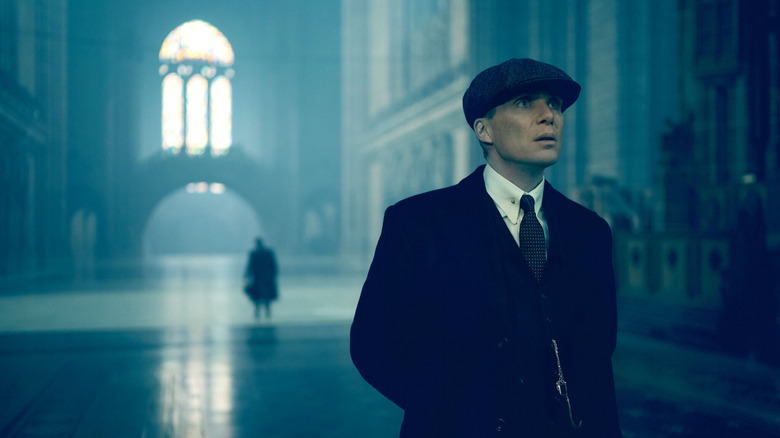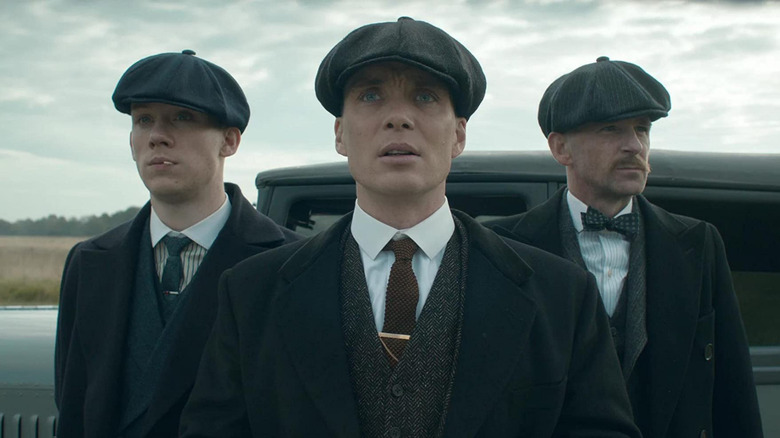Steven Knight Approached Peaky Blinders Like An Old-School Western Film
A pivotal moment of the British crime series "Peaky Blinders," late in the series' sixth season, sees members of the show's central street gang taking revenge against an Irish Republican Army leader for the murder of one of their own. Under the thin moonlight, gunfire competes with passing trains to see which can deafen Birmingham residents faster. The cobblestone road of Small Heath gives away the positions of the warring criminals as they scramble for cover, and the dense fog provides a blanket nearly as thick as a dust storm. Between exchanged shots, a woman and her children pass through the steel-and-rubble no man's land, where one of the girls picks up a spent shell. Her mother warns that if she wanders too far in the dark, "the Peaky Blinders'll get you."
Such is the mythology that runs through Steven Knight's gangster saga, which aired its final episode in April of this year. Loosely based on the real-life urban gang of the early 20th century, "Peaky Blinders" has earned a sturdy following for its dynamite cast led by Cillian Murphy as crime boss Tommy Shelby, for its stylized, intense depiction of post-WWI Birmingham, and for the exhausting relevance of its politics, which /Film's Joshua Meyer writes, "still manages to wrangle peril and occasional pathos" out of its narrative.
The Birmingham of "Peaky Blinders" is a place of expansion and lawlessness, a place that breeds a culture of violence for members of the Shelby clan and the working class around and among them — something the cast struggled with at times. But Knight sees a parallel between the hardship-born street gangs of post-WWI Birmingham, and the lawless American frontier mythologized in cinema.
Gangs of Birmingham
The Peaky Blinders have always been the stuff of legend for Steven Knight. Born in Birmingham, the filmmaker has claimed family ties with the infamous Sheldon gang through his paternal line. /Film's Fatemeh Mirjalili further writes of Knight hearing stories of the Blinders gang growing up, aiming to mythologize the gangsters as self-made "celebrities of their age."
On the show's official website, Knight explains:
"I wanted to approach 'Peaky Blinders' in the same style the Americans approached their history on TV. Cowboys were nineteenth-century agricultural labourers, but writers and filmmakers had turned their lives into the Wild West. I wanted to maintain an atmosphere on screen where we paid our respects to the lives of British people from that post-First World War era, rather than pitying them. I wanted viewers to imagine the characters in such a way that they looked up to them."
Those characters include recognizable real-life names like Winston Churchill and Al Capone, people whose documented lives are easy to follow. Others like Tommy Shelby took inspiration from their real-world counterparts. In the sort of fictionalization used in HBO's Prohibition-era series "Boardwalk Empire" — as Jeremy Smith notes, the legend "loses its luster" if one can pull up the entire history on Wikipedia. Knight further says on the website that elements of the stories he'd heard as a kid made their way into the writing process, "little character details and fragments that I pieced together to make a far bigger picture."
That bigger picture transformed childhood tales of a local gang into a powerful gangster epic that set a new standard for prestige television.

